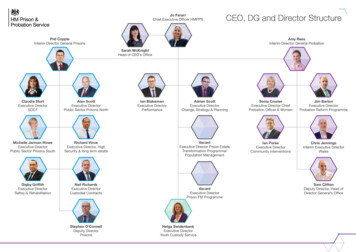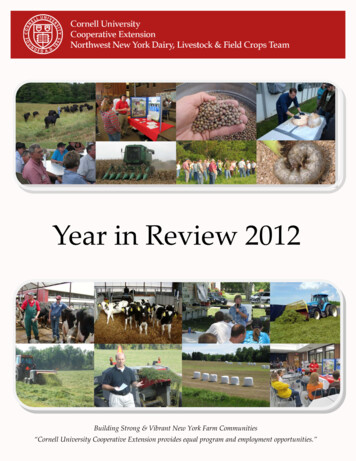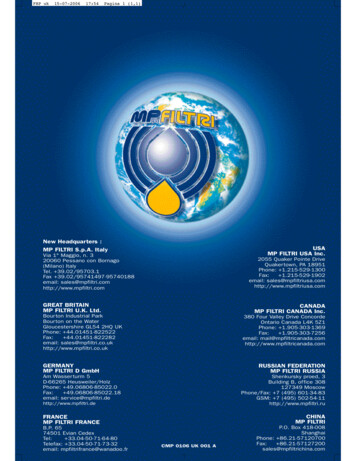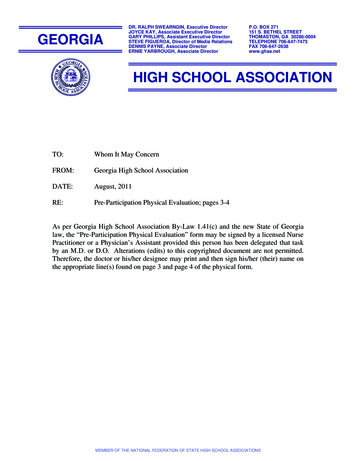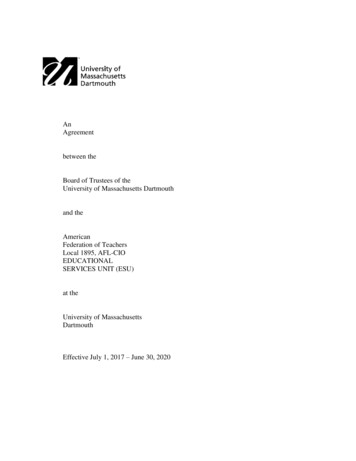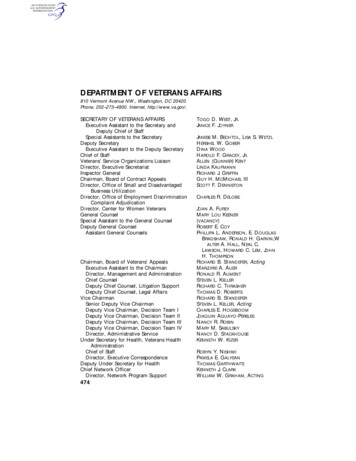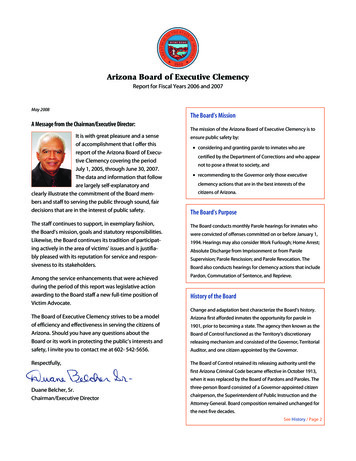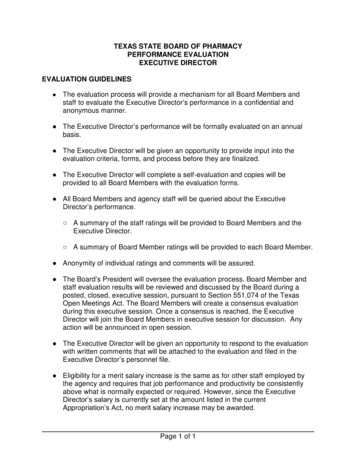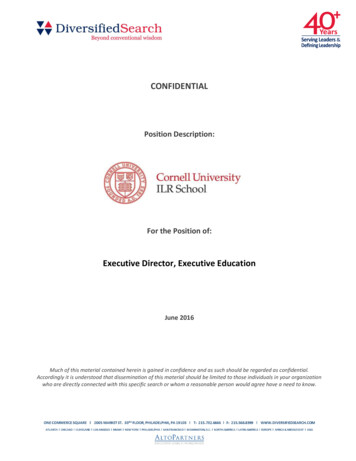
Transcription
CONFIDENTIALPosition Description:For the Position of:Executive Director, Executive EducationJune 2016Much of this material contained herein is gained in confidence and as such should be regarded as confidential.Accordingly it is understood that dissemination of this material should be limited to those individuals in your organizationwho are directly connected with this specific search or whom a reasonable person would agree have a need to know.
Confidential Position DescriptionTitle:Executive Director, Executive EducationILR SchoolInstitution:Cornell UniversityReports to:Academic Director, Executive EducationILR SchoolLocation:New York City and Ithaca, New YorkSummary of Opportunity:The ILR School at Cornell University seeks a seasoned leader to develop and expand its executiveeducation programs in New York City, Ithaca, and other venues. This is an exciting opportunity for anexperienced leader with a deep understanding of human capital and professional development needsand business practices and strong business development skills to align with the premier educationalorganization in the country committed to advancing the world of work.Cornell, founded in 1865, is a privately endowed research university and partner of the StateUniversity of New York. As the federal land-grant institution in New York State, Cornell has aresponsibility – unique within the Ivy League – to make contributions in all fields of knowledge in amanner that prioritizes public engagement to help improve the quality of life in the state, the nation,and the world. (For a description of Cornell University, see Appendix A). This vision is realized in theILR School whose land-grant mission is to advance the world of work through teaching, research, andoutreach and to generate and disseminate leading-edge knowledge to solve human problems,manage and resolve conflict, establish best practices in the workplace and inform government policy.The School’s executive education and professional development programs draw upon the expertiseof ILR faculty to work with corporations, non-profit and public sector organizations to promotecutting-edge ideas in training, development, and organizational learning.The new Executive Director of Executive Education and Professional Developments will haveresponsibility for articulating and operationalizing an entrepreneurial vision for state-of-the-arttraining and leadership development that is aligned with the research, teaching, and expertise of theILR resident faculty. Primarily located in New York City with travel to other sites, the ExecutiveDirector will oversee Executive Education/Human Capital Development executive and professionalprograms, which currently include – public and certificate programs, on-site programs, customCornell UniversityExecutive Director, Executive Education, ILR SchoolPrepared by: Kim M. Morrisson, Ph.D. and Andrew C. WheelerPage 2
programs, and on-line and blended learning. The ILR School seeks an exceptional leader withdemonstrated expertise in human resources and people management broadly defined, anentrepreneurial portfolio of management accomplishments, and a passion for executive education topromote the expertise and impact of ILR on the partners and clients it serves.The School of Industrial and Labor RelationsThe Industrial and Labor Relations (ILR) School of Cornell University is the leading college of theapplied social sciences focusing on work, employment, and labor policy issues and practices ofnational and international significance. The ILR School mission is to advance the world of workthrough teaching, research, and outreach. ILR generates and disseminates leading-edge knowledgeto solve human problems, manage and resolve conflict, and establish best practices in the workplaceand to inform government policy. ILR’s goal is to prepare leaders, inform national and internationalemployment and labor policy, and improve working lives.To achieve this end, the school offers undergraduate (a BSILR degree) and graduate education (PhD,MS, MILR, MPS, and EMHRM degrees) as well as career-long learning for professionals. Areas of studyinclude human resource management; labor-management relations; labor economics; organizationalbehavior; international and comparative labor; labor relations, labor law and history; conflictresolution; management development; diversity management; employment and disability; and socialstatistics.An ILR education is grounded in the social sciences but is also practical and applied. Students andfaculty explore and gain an understanding of humanbehavior through the lens of the workplace. Students alsolearn how organizations work and how they fit into the largersociety and economy. As a result, they acquire knowledgeand skills that help them to solve problems on-the-job and tobuild and manage productive work relationships. ILR hasmore full-time faculty involved in teaching and research thatspans the broad range of work and employment disciplinesthan any other educational institution of its kind. Its MartinP. Catherwood Library is regarded as the most comprehensive source of information in North Americaon work, employment and labor issues.ILR enrolls roughly 1,200 undergraduate and graduate students on the Ithaca campus. They aretaught by more than 100 faculty (65 tenure-track) and practitioners. More than 20,000professionals complete training and professional development every year through ILR programs inmanagement development, conflict resolution, HR, diversity/EEO, labor relations, union leadershipand executive education offered in Ithaca, New York City, Rochester, Buffalo, among other locationsCornell UniversityExecutive Director, Executive Education, ILR SchoolPrepared by: Kim M. Morrisson, Ph.D. and Andrew C. WheelerPage 3
and online. More than 13,000 ILR alumni work as leaders at Fortune 500 companies in diverse fieldsincluding HR, labor relations, sports and entertainment, management, unions, law, the non-profitsector, government and public service.ILR School HistoryThe idea seemed radical at the time: Establish a college where faculty and students could grapple withissues creating conflict in the workplace, including the adversarial relationship between labor andmanagement. This daring vision, coming on the heels of the Great Depression and then World WarII, led to the founding of the ILR School by the New York State legislature in 1945. The school wascharged with a mission "to improve industrial and labor conditions in the State through the provisionof instruction, the conduct of research, and the dissemination of information in all aspects ofindustrial, labor, and public relations, affecting employers and employees."Given a home at Cornell University, ILR embodied both the intellectual rigor of the Ivy League and thedemocratic spirit of state universities. It created amultidisciplinary social sciences faculty that valued academicachievement and practical expertise. On-campus offeringspromised students a liberal education with a professionalorientation while off-campus extension programs broughtinsights about the workplace to professionals and the widercommunity.The ILR School was founded with a focus on labor relations, but as the world of work evolved, theschool’s offerings have broadened to keep pace with that change and now focus on a broad array ofworkplace issues, including many with global impact. While the New York State School of Industrialand Labor Relations remains the official name, today it operates simply as the ILR School.Organizational StructureThe ILR School comprises six academic departments that encompass the interdisciplinary, socialsciences-based field of workplace studies. A full array of undergraduate and graduate courses and avariety of degree programs are offered, taught by faculty members who are experts in a particularaspect of the broader field. Students benefit from this ongoing interchange of ideas and knowledgeand close interaction with faculty.The ILR departments include:Labor Relations, Law and HistoryHuman Resource StudiesInternational and Comparative LaborCornell UniversityExecutive Director, Executive Education, ILR SchoolPrepared by: Kim M. Morrisson, Ph.D. and Andrew C. WheelerPage 4
EconomicsSocial StatisticsOrganizational BehaviorBecause the workplace provides a source of unlimited research and programmatic opportunities, ILRhas identified a variety of themes related to work and employment upon which to build study,training, education, and practice-oriented initiatives. These activities are facilitated by the ILR centersand institutes, including the Cornell Center for Advanced Human Resource Studies, (CAHRS), K. LisaYang and Hock E. Tan Institute on Employment and Disability (YTI), the Labor Dynamics Institute (LDI),and the Martin and Laurie Scheinman Institute on Conflict Resolution, among others.CAHRS is particularly noteworthy because it is the world's leading partnership between industry andacademia that is devoted to global human resource management. CAHRS partners includeapproximately 60 of the world's premier companies, who help bridge industry with Cornell University,the ILR School, and HR Studies faculty, students and leading practitioners throughout the world. TheCAHRS relationship offers the opportunity to work directly with key HR Studies faculty and students,to participate in, influence, and be the first to learn about new research findings and applications.A full list of ILR centers and institutes is included below.Center for Advanced Human Resource Studies (CAHRS)Cornell Higher Education Research Institute (CHERI)ILR Executive Education and Professional DevelopmentInstitute for Compensation Studies (ICS)Institute for Workplace Studies (IWS)International ProgramsK. Lisa Yang and Hock E. Tan Institute on Employment and Disability (YTI)Labor and Employment Law ProgramLabor Dynamics Institute (LDI)Global Labor Institute (GLI)Scheinman Institute on Conflict ResolutionSmithers Institute for Alcohol-Related Workplace StudiesThe Worker Institute at CornellCornell UniversityExecutive Director, Executive Education, ILR SchoolPrepared by: Kim M. Morrisson, Ph.D. and Andrew C. WheelerPage 5
ILR in New York CityOutreach through continuing education is part of the ILR mission, and the school offers a wide rangeof courses, workshops, and certification programs. In addition to the Ithaca campus, regional officesare maintained in Buffalo, Rochester, and New York City. The ILR School has approximately 60 staffmembers located in its NYC Office, situated at the cornerof E. 34th Street and Madison Avenue, in the heart of Midtown Manhattan. Importantly, Cornell University isconstructing its Tech Campus on Roosevelt Island in NewYork City with which ILR will be engaged.At ILR's New York City office, theory and practice come together through a range of outreachprograms, services, and activities to bring ILR expertise on workplace issues to organizations,executives, managers, and practitioners; union leaders and members; policy makers; and workingadults. Programs include the Masters of Professional Studies degree, dozens of managementdevelopment and human-resources workshops and certificate programs, a robust labor relationsprogram, international offerings, and union workshops. Other areas of focus include employmentand disability, compensation studies, conflict resolution, and labor and employment law.ILR School LeadershipThe ILR School is led by Professor Kevin Hallock, the Kenneth F. Kahn ‘69 Dean and the Joseph R. Rich’80 Professor of Economics and Human Resource Studies in the ILR School. At Cornell since 2005,Kevin was appointed Dean in 2015.Other members of the leadership team include Linda Barrington, Associate Dean for Outreach andSponsored Research and Executive Director of the Institute for Compensation Studies (ICS), aninterdisciplinary initiative that analyzes, teaches, and communicates broadly about monetary andnon-monetary rewards from work; and Brad Bell, Academic Director of Executive Education, andProfessor of Human Resource Studies. He also serves as Director of the Executive Masters in HumanResource Management (EMHRM) degree program. The Executive Director of Executive Educationreports to Brad Bell and to Linda Barrington, through her outreach responsibilities.For fuller biographical descriptions of ILR School Leadership, see Appendix B.Executive Education at the ILR SchoolThe ILR School has had an “executive education” program since its founding in 1945. As a statutorycollege, ILR has historically used the terms “Extension” to cover the broad array of assistance providedto public and private entities. Until recently, executive education was split between two units – aCornell UniversityExecutive Director, Executive Education, ILR SchoolPrepared by: Kim M. Morrisson, Ph.D. and Andrew C. WheelerPage 6
smaller Executive Education unit on the Ithaca campus that focused on executive training and a largerHuman Capital Development (HCD) group, located in New York City, which offered short openenrollment programs. In 2015, these programs were combined into a unified Executive Educationunit, overseen by an academic director, Professor Brad Bell, located on the Ithaca campus.The Executive Education unit currently supports four types of offerings. These include: Public and certificate programs where participants come to the NYC Office for 2 or 3 dayprograms. While these are generally lower cost, they were historically higher volume,providing a reliable revenue base. On-Site Programs that involve travel to the client’s business to deliver programs that arederived from offerings in the public and certificate program portfolio. These programs arecost-effective for the client and good value for the price but need to be marketed and soldmore aggressively. Custom Programs which include a significant amount of design and may require a long leadtime in terms of sales, sometimes up to a year. These contracts typically exceed 100,000.These can be highly profitable programs and have been the basis for some of ILR’sinternational executive education initiatives over the last 5 years. On-Line and Blended Learning programs have grown significantly through a variety of means.The ILR School was a founding partner of eCornell, a private but wholly owned subsidiary ofCornell. ILR works with eCornell to blend on-line learning options with in-person programs tocreate customized offerings for its clients. ILR also has in-house capabilities to deliversynchronous and asynchronous programs for corporate, government, non-profit, andprofessional association clients.The Executive Education program currently earns about 4- 5 million in revenue per year. Throughthe creation of the unified program and more strategic planning and investment, ILR would like togrow revenues and increase profit margins over the next five years while ensuring the design anddelivery of high quality programs to both the domestic and international markets that showcase ILR’sunique experience and influence in the world of work.The Position: Role SummaryThe position will report to the Academic Director of Executive Education for strategic direction, yearlyand monthly initiatives and supervision of day-to-day performance; with oversight by the AssociateDean for Outreach and Sponsored Research on fiscal matters and outreach collaboration. TheExecutive Director will have responsibility for articulating and operationalizing an entrepreneurialCornell UniversityExecutive Director, Executive Education, ILR SchoolPrepared by: Kim M. Morrisson, Ph.D. and Andrew C. WheelerPage 7
vision for state-of-the-art training and leadership development that is aligned with the research,teaching, and expertise of the ILR resident faculty. In carrying out this responsibility, the ExecutiveDirector will engage with ILR faculty and key stakeholders to build a business model for enhancedquality and expanded market success that is aligned with the goals and fundamental core of the ILRSchool.The Executive Director oversees a team of four program directors, most of whom are located in NewYork City. The directors design and oversee program delivery. They oversee a staff of about 12program and administrative assistants who support ILR’s offerings. Content is taught by the resident(tenured) ILR faculty, extension (practice) faculty, and skilled practitioners.The new Executive Director will bring creative leadership to addressing the following specificresponsibilities: Ensure that program offerings are of consistently high quality and are assessed using data andmetrics that help drive continuous improvement; Work collaboratively to nurture an effective relationship with ILR faculty, to understand theirinterests and expertise, and to design programs that are strategically positioned to build onthe strengths of ILR; Represent ILR and the resident faculty’s interests in interactions with the new Cornell Collegeof Business, particularly in planning for the possible integration of executive education undera single Cornell umbrella. Work closely with ILR Centers, Institutes and Outreach Programs, particularly with CAHRS, tobuild relationships and broaden the offerings of executive education. Serve as an ex-officiomember of the CAHRS Board of Advisors, working in close consultation with the HR Studiesfaculty. Develop and execute an aggressive operating plan that supports the strategic priorities of theILR School and the needs of its key clients. Identify, develop, and secure professionaldevelopment contracts with major corporations, non-profit, and government entities. MatchILR’s program offerings and content to the client’s needs, interests, and long-term goals. Remain well-versed on a broad range of best practice and/or advances in innovative thinking,research, policy, and globalization impacts. Cultivate and maintain a network of relationships to understand the major needs, positions,and actions of key client/stakeholder groups.Cornell UniversityExecutive Director, Executive Education, ILR SchoolPrepared by: Kim M. Morrisson, Ph.D. and Andrew C. WheelerPage 8
Cultivate a shared vision and foster a collaborative and supportive work environment basedon integrated goals and objectives. Develop a strong team, promote accountability, andprovide recognition and support.Opportunities and Challenges AheadThe new Executive Director will be faced with a number of opportunities and challenges that aredriven by the changing landscape of the University, the competitive nature of the field, and theparticular character and expertise of the ILR School. These include: The emerging Cornell College of Business and its implications for executive educationThe integration next academic year of three previously separate entities – the Johnson GraduateSchool of Management, the School of Hotel Administration, and the Dyson School for undergraduatebusiness education – into the Cornell College of Business offers potential opportunities to marketbusiness education under a single umbrella. This changing landscape will present many opportunitiesand some challenges for the new Executive Director, especially in representing and advancing ILR’sinterests. Bringing a more strategic focus to ILR Executive EducationExecutive education has been somewhat opportunistic rather than strategic in previous years,offering a wide range of programs that take up resources and do not strategically advance thereputation of the school. The new Executive Director will be expected to drive growth morestrategically through the development of long-term partnerships and higher-margin engagementsthat better leverage the resources of ILR and that are aligned with the expertise of the faculty. Broadening and diversifying Executive Education offeringsILR delivers much of its custom executive education through a small core group of resident (tenured)faculty. Executive programs have largely been delivered using five talented senior faculty membersin the Human Resource Studies department, some of whom are reaching capacity, and the numberof faculty who are available, interested, and skilled in teaching to an executive audience in thisdepartment is limited. The new Executive Director will be expected to explore new opportunities forgrowth – whether by expanding programs that build upon the strengths of other faculty within ILR,or by identifying other means of delivery that are consistent with ILR’s expectations of high quality.Cornell UniversityExecutive Director, Executive Education, ILR SchoolPrepared by: Kim M. Morrisson, Ph.D. and Andrew C. WheelerPage 9
Continuing integration with the Center for Advanced Human Resources (CAHRS)CAHRS is a membership-based organization comprising 65 Chief Human Resource Officers fromFortune 500 firms. It has been operated as a think-tank that focuses on emerging trends, with a rangeof programs in which members can participate based on their subscription fees. Led by its facultydirector, Chris Collins, CAHRS is a gem of the ILR School, providing tremendous opportunities forstudents and for strong relationships with the practitioner community who serve in an advisorycapacity for ILR’s HR Studies Department, and provide valuable insight to the ILR School overall.Relationships with CAHRS members have been protected, thus limiting opportunities for cross-sellingand outreach to CAHRS members. The new Executive Director will need to navigate this balance toprovide the greatest value to CAHRS and to the School while also maximizing the opportunities theserelationships create. Increasing the emphasis on business development and growthThe ILR School has not had a history of robust business development in executive education, relyingprimarily on its strong reputation in the field to attract potential clients. Future growth will require amore proactive approach, and the new Executive Director will need to be a strong business developer,able to focus on a client’s needs and match them with a clear understanding of the strengths of thefaculty within ILR. Maximizing the potential of Cornell’s new Tech campus in New York CityThe development of Cornell’s new Tech campus on Roosevelt Island offers a tremendous strategicopportunity for ILR, which will likely have a presence there. The Executive Director will need todetermine how best to take advantage of this development and its implications for partnerships,collaborations, and other executive education opportunities for ILR.Addressing these opportunities will require the skills of a strategic thinker, an accomplishedpractitioner, a strong collaborator and boundary-spanner, and a proven business developer who canmake the right connections between market needs and ILR expertise.Requirements and QualificationsThe ILR School seeks a strategic leader with significant HR executive experience as the new ExecutiveDirector. She or he will understand human resources, management, and related ILR fields. It will bevital that the Executive Director have an appreciation of all the disciplines represented in ILR and aprofound respect for the pillars of an academic enterprise – both the creation of new knowledge andCornell UniversityExecutive Director, Executive Education, ILR SchoolPrepared by: Kim M. Morrisson, Ph.D. and Andrew C. WheelerPage 10
excellence in teaching. The Executive Director must have a genuine affinity for supporting thesepillars and a deep appreciation for the time and capabilities of the faculty.The successful candidate will ideally possess a background of substantive leadership in HR. She or hemust demonstrate evidence of excellent financial, human resource management, and businessdevelopment skills; collaborative skills in working with a strong management team, department headsand an innovative energetic faculty; and possess a track record of accomplishments that will generatecredibility in the field as the spokesperson for ILR executive education. A strong level of engagementwith leaders from diverse sectors would be valuable.Given the need to balance the interests of multiple constituents, the Executive Director must beskilled in stakeholder management. She/he should be a builder of partnerships and relationshipsacross diverse constituents, including faculty, with a style that is collegial, collaborative, andauthentically interested.The following criteria are essential: An advanced degree (master’s degree or higher) in an area related to the expertise of the ILRSchool (e.g., human resources/management/business, organizational behavior/change,diversity/inclusion, industrial and labor relations, employment or labor law, workforcelearning and development, etc.); A deep understanding of the human resources function to enable credible conversations withC-suite executives about the needs of the organization and ILR’s ability to deliver high qualitysolutions; An understanding of the executive education market and how ILR can best leverage its brand,offerings, delivery models, and marketing channels to best advantage. A strong network of contacts who can be called upon to generate new partnerships; Proven ability to close contracts with an eye to the development of partnerships, long-termengagements, and trusted advisor relationships.In addition, the successful candidate will demonstrate the following qualities and characteristics: Preferred experience as a senior leader in human resources in a sophisticated, well-respectedcorporate, non-profit, or public sector environment;Cornell UniversityExecutive Director, Executive Education, ILR SchoolPrepared by: Kim M. Morrisson, Ph.D. and Andrew C. WheelerPage 11
Exceptional leadership and vision. Providing leadership in strategy development to advanceILR’s executive education mission; Highly engaging personal style with executive presence, energy, excellent active listeningskills, charisma, and exceptional communication skills to promote ILR; A track record of success in hiring, leading, mentoring, coaching, and managing professionalstaff and work teams; An entrepreneurial and innovative attitude and orientation together with the ability to seeopportunity and thrive in a time of uncertainty; Personal and professional integrity, fair and just decision making, keen intellectual capacityand creativity, strategic focus, open and persuasive approach to communication, ability tooperate within a complex environment and to collaborate with multiple stakeholders; Collegiality and genuine interest in working with a diverse group of faculty and staff; and Exceptional business skills, including financial, administrative, and team-building skills, acommitment to transparency, and a strong sense of fiscal accountability.Diversity and Inclusion are a part of Cornell University’s heritage. We’re an employer and educator recognized forvaluing AA/EEO, Protected Veterans, and Individuals with Disabilities. All qualified applicants will receive considerationfor employment without regard to their age, ancestry, color, disability, gender identity, marital status, national origin,parental status, race, religion, sex, sexual orientation, citizenship, or protected veteran status.Cornell UniversityExecutive Director, Executive Education, ILR SchoolPrepared by: Kim M. Morrisson, Ph.D. and Andrew C. WheelerPage 12
Search Team and Contact InformationCornell University has retained Diversified Search to assist in this search process. Confidentialnominations, recommendations or expressions of interest (cover letter, CV, and five references) inthe position should be directed electronically to: EDEE ILR@divsearch.com.Team:Kim M. Morrisson, Ph.D.Senior Managing Director, Education and Not-for-Profit Leadership Searches215 656-3546kim.morrisson@divsearch.comAndrew C. Wheeler, Practice Leader,Education and Not-for-Profit Practice and Managing Director215 656-3548andrew.wheeler@divsearch.comNancy HelfmanVice President and Senior ren A. EngelExecutive Assistant215 656-3557Karen.Engel@divsearch.comDiversified SearchOne Commerce Square, 2005 Market StreetSuite 3300, Philadelphia, PA 19103www.diversifiedsearch.comFax: 215.568.8399Search 12669 05/2016Cornell UniversityExecutive Director, Executive Education, ILR SchoolPrepared by: Kim M. Morrisson, Ph.D. and Andrew C. WheelerPage 13
Appendix A: Cornell University: An OverviewCornell was founded in 1865 as a coeducational, non-sectarian institution where admission wasoffered irrespective of race or religion. Its founders, Ezra Cornell and Andrew Dickson White, intendedthat the new university would teach and make contributions in all fields of knowledge—from theclassics to the sciences and from the theoretical to the applied. These ideals, unconventional for thetime, are captured in Cornell's motto, an 1865 Ezra Cornell quotation: "I would found an institutionwhere any person can find instruction in any study."Once called "the first American university" by educational historian Frederick Rudolph, CornellUniversity represents a distinctive mix of eminent scholarship and democratic ideals. The universitytoday continues to reflect this heritage of egalitarian excellence. It is home to the nation's firstcolleges devoted to hotel administration, industrial and labor relations, and veterinary medicine.Cornell is both a private university and the federal land-grant institution of New York State and is thelargest and most educationally diverse member of the Ivy League. Considered one of the world’s topresearch universities, Cornell’s research informs its teaching and extension outreach missions.Cornell enrolls students who benefit from outstanding educational programs, a prestigiousintellectual tradition, a democratic spirit and sense of public service. The university is organized intofourteen colleges and schools, offering instruction in virtually every field including a broad array ofinterdisciplinary programs, each definin
Executive Education at the ILR School The ILR School has had an "executive education" program since its founding in 1945. As a statutory college, ILR has historically used the terms "Extension" to cover the broad array of assistance provided to public and private entities. Until recently, executive education was split between two units .
